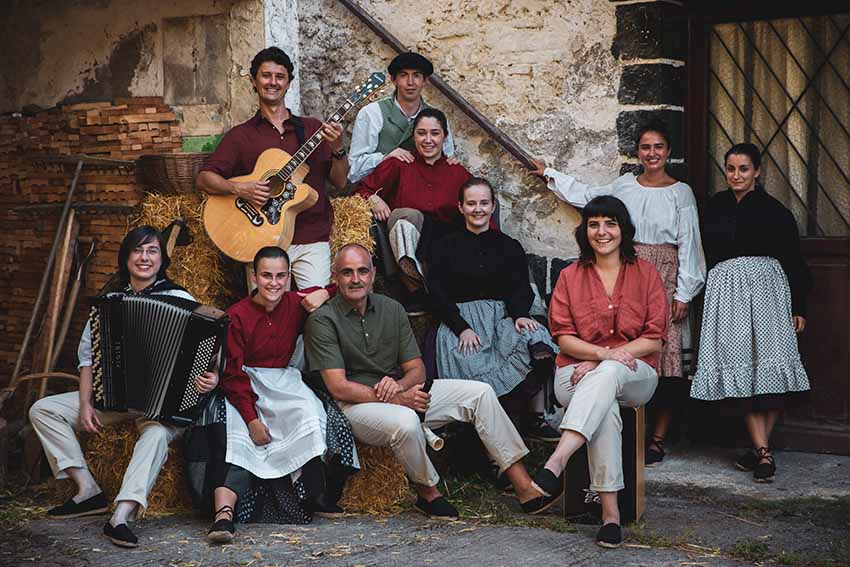Joseba Etxarri / Hernani, Gipuzkoa. Bitartean, a folk group from Hernani, includes both Basque and Argentine ingredients. Created in 2012, the group is comprised of Sebastian Ustarroz Dabadie, Garazi Navas Mundiñano, Ixiar Jauregi Loiarte and Haritz Ezeiza Zabala. “Four of us have connections to the Basque Diaspora, especially that in Argenitna,” they told EuskalKultura.eus. “Born on both sides of the ocean, we drink from both fountains, and we dedicate our work to both,” they told us during their introduction.
-You all have a notable personal connection with Argentina and the Diaspora…
-“Sebastian, for example, was born in Necochea, although he lives in Euskal Herria, and has established his family here.” “His grandfather emigrated from Erronkari-Roncal, Navarre as a young man in search of better opportunities and his story is like so many other archetypal ones of our emigration. He spent his first years in San Andres de Giles, in the north of the Buenos Aires province. With the money he made, he bought some land and built a modest house. The situation here was not good and when he could, he brought five of his brothers over. One of them got sick and died during the passage; his cadaver was thrown into the sea, out of fear that it would contaminate others on board". "Mother's side was of Xiberoan origin, the family of the renowned Anton Abbadie. Sebastian’s great-grandfather settled in Necochea, and married an indigenous woman, and raised his family there. Sebastian is a true “kreole,” and a pillar of the CD thus its name.”
-It is true that many people from all over the Basque Country, including Hernani, emigrated to Argentina. In my own case, I have family and my grandfather’s brothers emigrated to Mendoza. In “Bitartean,” the links with the Diaspora reach everyone.
-“Haritz (Ezeiza) also have family that emigrated at the end of the 19th century looking, as many other humble families, land where they could prosper. They lived in Garin, in the province of Buenos Aires, and were dedicated to agriculture. They lost their connection for many years, but a couple of years ago, they recuperated it and were able to join families from here and there.” “Garazi Navas also has family in Argentina. Ixiar Jauregi also has strong ties, and she has traveled there more than once. Her first trip was to participate in the “Hator Hona,” program with youth at the Necochea Basque Club.
-Out of curiously: on the “Kreole” CD there is a song called “Arano.” And Arano, besides being a town in Navarre, near Hernani [my grandmother Maria was from Arano] is also the name of a town in Argentina that I had the pleasure of visiting some years ago, in the plains of La Pampa, a town with Basque history, which still preserves the ruins of a fronton. Was that song dedicated to the Basque Country Arano, or to Argentina one?
-Haritz Ezeiza’s family is from Arano, Navarre, where they were born, and from where some of them left for Argentina, hence the Arano melody.”
-With “Kreole,” were you trying to vindicate your ancestors who emigrated and honor, while sharing that reality that is so present, and not so renown in our history that today we call the Diaspora?
-“We wanted to reflect and call attention to the important migratory movement that the Basque Country experienced during the 19th and 20th centuries. The famines on the one hand, and wars on the other, as occurs today in other countries, forced our people to leave their homes and go abroad, and we wanted to tell about it. We have searched texts, for example, in the book Ameriketako bertsoak, (Bertsos from Amerika), by Antonio Zavala in 1984. Selecting some of the bertsos that he collected, we arranged the second song, “Adiorik ez,” (no good-byes), and the 10th, “Denak ez ziren Indiano,” (All weren’t rich). There is no doubt, that the testimonies of many of the people around us have been a remarkable source of inspiration for us in this endeavor.”
Videoclip: 'Denak ez ziren indiano' (Kreole, 2020) Bitartean and Ttarla
- You include dance as part of the show...
-“For this project, we decided to invite Ttarla, a dance group from Hernani to join us and contribute their good work to the songs we had composed and thus reinforce all the feeling that underlies the project with movement.”
-What steps have you taken so far? Are you planning to present the album in the Diaspora? How can people get in touch with you?
-“The group has performed, since its beginning, in France, Ireland and Wales. We had organized a small tour in 2020 that was cancelled due to the pandemic. We are now returning with renewed energy and we would love to present the project as far as possible. It will debut on March 4th in Hernani and on the 18th in Zornotza. Of course, we would love to play in the Diaspora and we are open to all proposals (bitarteanfolk@gmail.com)..
-March 4th. in Hernani, at 17:00 and 19:00: Show "Denak ez ziren indiano".
-Bitartean folk group: Ixiar Jauregi Loiarte (vocals and percussion), Garazi Navas Mundiñano (accordion), Haritz Ezeiza Zabala (txistu and alboka), Sebastian Ustarroz Dabadie (guitar and vocals)
-Ttarla dantza taldea. Choreography, Izar Aizpuru. Dantzaris: Olatz Encinas - June Olaran - Andrea Galan - Udane Arruti - Igantzi Olaran - Maddi Galarza
-Concert on March 4th at Hernani’s Cultural Center
-With the 7pm session sold out, they will perform a second at 5pm.
-Concert in Zornotza, Bizkaia. March 18th, buy here the tickets






 Send to a friend
Send to a friend Add comment
Add comment








